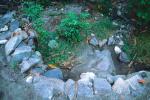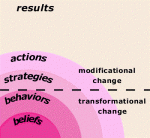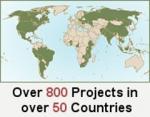Heifer International: Long-Term Solutions
 The food crisis has caused a lot of organizations to reevaluate their approach to food assistance. Moving further away from providing only short-term relief and investing in long-term agricultural development. Heifer International has been confronting hunger in more than 50 countries over the past 64 years, including Haiti. They adopted an innovative approach of "Passing on a Gift"-give an animal to a local family and they pass on the offspring to other families. Their projects in Haiti are definitely worth sharing.
The food crisis has caused a lot of organizations to reevaluate their approach to food assistance. Moving further away from providing only short-term relief and investing in long-term agricultural development. Heifer International has been confronting hunger in more than 50 countries over the past 64 years, including Haiti. They adopted an innovative approach of "Passing on a Gift"-give an animal to a local family and they pass on the offspring to other families. Their projects in Haiti are definitely worth sharing.
 Gathering from their website, Heifer began working in Haiti right after Hurricane Jeanne devastated Gonaives (once again). After immediate needs for shelter, food, and fresh water were met, Heifer looked at long-lasting solutions to deforestation in Haiti. The people's desperate need for food gives them no alternative-even if it means harming their own environment. Making satisfying hunger a top priority for Heifer. But, what's really appealing is their determination to increase domestic animal and plant production while improving the environment and natural resources. All of this being a local and community-driven initiative. Heifer calls this their ‘agroecology' approach.
Gathering from their website, Heifer began working in Haiti right after Hurricane Jeanne devastated Gonaives (once again). After immediate needs for shelter, food, and fresh water were met, Heifer looked at long-lasting solutions to deforestation in Haiti. The people's desperate need for food gives them no alternative-even if it means harming their own environment. Making satisfying hunger a top priority for Heifer. But, what's really appealing is their determination to increase domestic animal and plant production while improving the environment and natural resources. All of this being a local and community-driven initiative. Heifer calls this their ‘agroecology' approach.
 One of their first programs in Haiti was the Hurricane Jeanne Environmental Recovery Phase I/II. The project included 1200 families in Gonaives, Saint Michel de l'Attalaye, and Gros Morne. In the first phase families received a variety of culturally relevant, fast-producing agricultural resources such as: beans, sweet potato, cassava, peanut seed, goats, chickens, seedlings, hoes, and machetes. In partnership with World Neighbors, Heifer began restoration efforts by providing temporary jobs to build rock walls in order to prevent overflow in the worst ravine areas. For every week of work, paid participants were required to donate one day of soil conservation labor to a neighbor in need.
One of their first programs in Haiti was the Hurricane Jeanne Environmental Recovery Phase I/II. The project included 1200 families in Gonaives, Saint Michel de l'Attalaye, and Gros Morne. In the first phase families received a variety of culturally relevant, fast-producing agricultural resources such as: beans, sweet potato, cassava, peanut seed, goats, chickens, seedlings, hoes, and machetes. In partnership with World Neighbors, Heifer began restoration efforts by providing temporary jobs to build rock walls in order to prevent overflow in the worst ravine areas. For every week of work, paid participants were required to donate one day of soil conservation labor to a neighbor in need.
 In the second phase of the Hurricane Jeanne Environmental Recovery, Heifer placed more attention on long-term solutions to highlight food security, environmental protection and risk management. World Neighbors and Heifer contributed technical assistance and training workshops on grain selection and storage, animal husbandry, organic composting, soil conservation, and project management. The same concept of ‘passing on a gift' was incorporated into the programs-where families share animal offspring, knowledge and skills.
In the second phase of the Hurricane Jeanne Environmental Recovery, Heifer placed more attention on long-term solutions to highlight food security, environmental protection and risk management. World Neighbors and Heifer contributed technical assistance and training workshops on grain selection and storage, animal husbandry, organic composting, soil conservation, and project management. The same concept of ‘passing on a gift' was incorporated into the programs-where families share animal offspring, knowledge and skills.
 I was especially drawn to this organization because of their approach. Heifer's cornerstones really tackle hunger from a human rights-based approach. They address food, education, gender equity, social, economic and other basic rights by recognizing the need for justice and dignity through sustainable development. Empowerment and community participation are an integral part of their project sustainability. The local community is motivated to define the current accessible resources and envision realistic goals for their future.
I was especially drawn to this organization because of their approach. Heifer's cornerstones really tackle hunger from a human rights-based approach. They address food, education, gender equity, social, economic and other basic rights by recognizing the need for justice and dignity through sustainable development. Empowerment and community participation are an integral part of their project sustainability. The local community is motivated to define the current accessible resources and envision realistic goals for their future.
 Heifer has also made it their point to take on other crucial initiatives in Haiti. These include programs addressing environmentally friendly agricultural techniques, animal management, HIV/AIDS education, and assisting people to start and scale up businesses. It's impressive that a majority of their programs use such a comprehensive strategy. In the ‘Integrated Training for Agricultural Development Project', Heifer aimed to improve the nutrition and income of families throughout four departments (North, South, West, Northeast). Heifer distributed goats, guinea fowls, Boer bucks, and rabbits to 80 families who passed on offspring to 110 other families. They trained project recipients in fruit processing, commercialization, animal husbandry, craft micro-enterprise, and marketing. Some programs even included education in family planning and gender equity.
Heifer has also made it their point to take on other crucial initiatives in Haiti. These include programs addressing environmentally friendly agricultural techniques, animal management, HIV/AIDS education, and assisting people to start and scale up businesses. It's impressive that a majority of their programs use such a comprehensive strategy. In the ‘Integrated Training for Agricultural Development Project', Heifer aimed to improve the nutrition and income of families throughout four departments (North, South, West, Northeast). Heifer distributed goats, guinea fowls, Boer bucks, and rabbits to 80 families who passed on offspring to 110 other families. They trained project recipients in fruit processing, commercialization, animal husbandry, craft micro-enterprise, and marketing. Some programs even included education in family planning and gender equity.
 You can learn more about Heifer International projects in Haiti by clicking here. There are over a dozen other environmental projects in Haiti as well as hundreds of other projects from all around the world on the website. It is definitely a great resource for those curious in integrative ideas addressing environmental issues. It's also interesting to note that Heifer pays particular attention to gender equity. The Zabriko Goat Production, Trees, and Literacy Program was the first in Haiti to have a management committee consisting of 90% women!
You can learn more about Heifer International projects in Haiti by clicking here. There are over a dozen other environmental projects in Haiti as well as hundreds of other projects from all around the world on the website. It is definitely a great resource for those curious in integrative ideas addressing environmental issues. It's also interesting to note that Heifer pays particular attention to gender equity. The Zabriko Goat Production, Trees, and Literacy Program was the first in Haiti to have a management committee consisting of 90% women!
Also check out Heifer's fun and interactive site by clicking here.
At this point it's hard to think about increasing agricultural productivity while parts of Haiti are under water. But long-term solutions, like those initiated by Heifer, need to be explored in order to prevent such extreme disasters. For now, it's the resilient spirit of the Haitian people that keeps us optimistic for Haiti's future.
Please feel free to post comments on other Heifer projects or environmental organizations in Haiti!
Add new comment